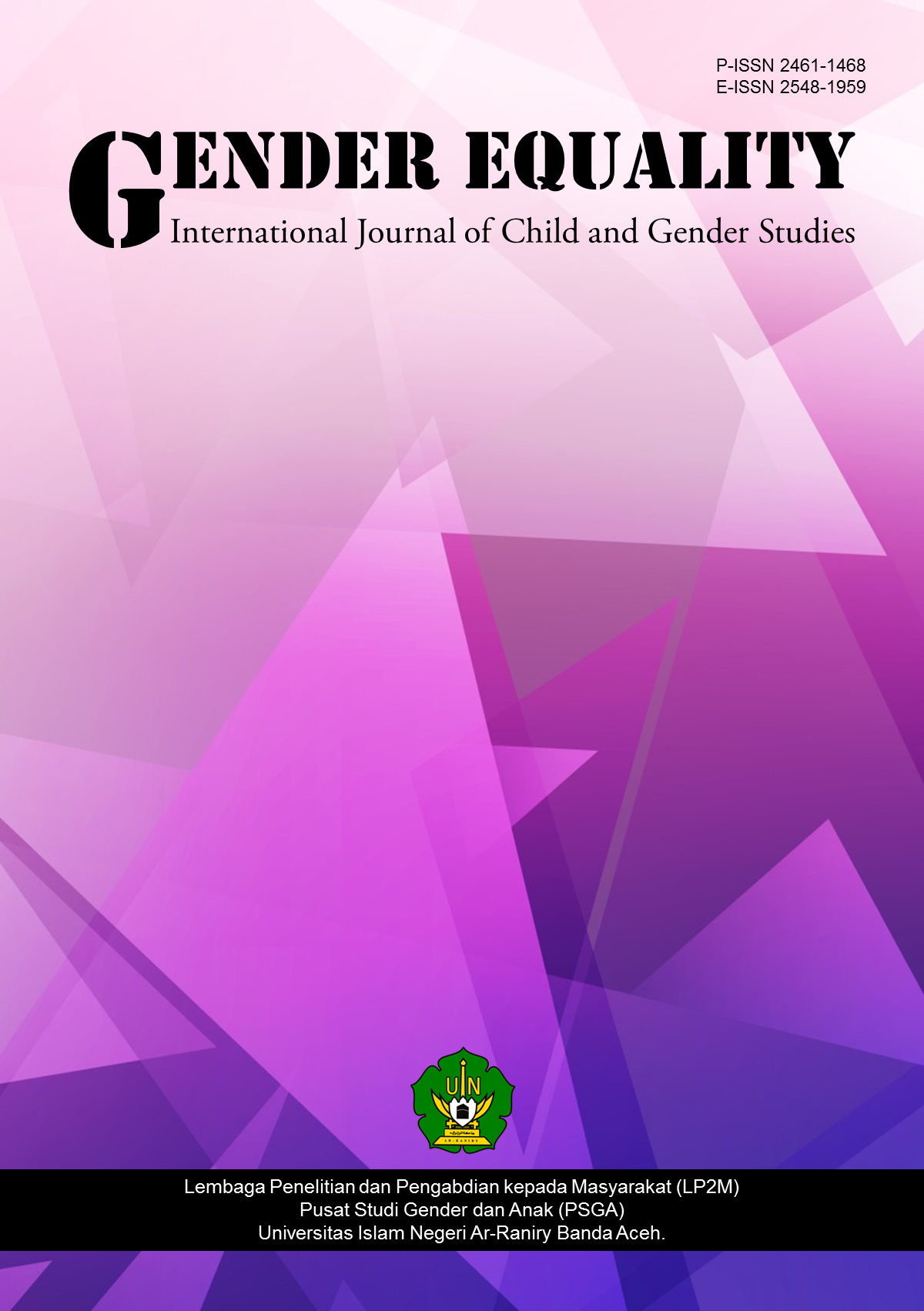HAK PENDIDIKAN PEREMPUAN MENURUT FUQAHA’ SYAFI’IYAH DENGAN PERSPEKTIF GENDER
DOI:
https://doi.org/10.22373/equality.v6i1.6116Keywords:
Women's Education, Shafi'iyah, GenderAbstract
With all the potential capital God gave, it is believed that man will be able to carry out his duties well. Then it is normal for God to place man as ' masterpiece ' of His own universe. In Shari'ah there is always a balance between the vertical and horizontal dimensions, the ideal and the realistic side, the constant doctrine (the Sabbath) and the Elastic (Murunah), the interests of the world and the Hereafter, the aspect of birth and the inner, interest of individuals and society, and Etc. The principle of benefit is no less important than the principle of balance. This remembers that it was the cause of the point-of-decline, the takeoff and the final goal in the formulation of a law (Maqashid Syari'ah). This research uses qualitative research methods by examining the Library Research related to the opinions of scholars ' followers of Imam Shafi'i on gender issues. Conclusion of the study: women have the same learning opportunities as men, both in material and learning methods, to achieve what is the essential goal of the education process. That is to achieve the perfection of the Insani that comes down to the self-approach (Taqarrub) to God and the realization of happiness in the world and the hereafter.
References
Affandi, M. (1990), The Methode Of Muslim Learning as Illustrated in al-Zarnuji’s Ta’lim al-Mutaallim, Tesis, ( Montreal: Institute Of Islamic Studes McGill Univerity,)
Al- Khathib, M. (1998), Pokok-Pokok Ilmu Hadist, Jakarta: Gaya Media Pratama.
Al-Buthi, M.S.R. (2005),PEREMPUAN, dalam pandangan hukum barat dan Islam, Yogyakarta: Suluh Press.
Al-Ghazali, A.H., Ihya' Ulum al-Din, Surabaya: al-Hidayah
Al-Ghazali, M. (1964), Al-Islam wa Al-Thaqat Al-Mu'attalat, Kairo: Dar Al-Kutub Al-Haditsah.
Al-KhotibM. A. tt. Ushul Hadist Uluumuhu wa mustholahahu-( Kairo: Daar al-Fikr),
Al-Zarnuji, Syarhu Ta'lim al-Muta'allim, Surabaya: Maktabah al-Hidayah
As-Saqa, M. (1995), Adab al-Dunya wa al-Din, Beirut: Dar al-Fikr.
Damanhuri, D. (2016). Reconstruction of Matan Hadith Understanding About Women Position in Household. Jurnal Ilmiah Peuradeun, 4(2), 239-256. doi:10.26811/peuradeun.v4i2.101
Departemen agama RI, (1994) Al-Qur’an dan terjemahnya, Semarang : PT.kumudasmoro Grafindo.
Djazuli, H.A, (2005), ILMU FIQH (Penggalian, Perkembangan, dan Penerapan Hukum Islam), Jakarta: Kencana.
Efendi, B. (2002). Mutiara Terpendam; Perempuan Dalam Literatur Islam Klasik, Jakarta: PT. Gramedia Pustaka Utama.
Ghazanfar, S. M., Adzim,A. (1990), Economic Thought of An Arab Scholastic: Abu Hamid Al-Ghazali, dalam History of political Economy, Durham: Duke University Press.
Gojali,N. (2004), Manusia, Pendidikan Dan Sains Dalam Perspektif Tafsir Hermenuetik Jakarta: Renika Cipta.
Hasan,C. (1995) Kajian perbandingan pendidikan, Surabaya: Al-Ikhlas.
Imam Hafidz Abu Abdillah Muhammad Bin Isma'il Bin Ibrahim Bin Mughiroh Bin Bardazbat Al-Bukhori, Shohih Bukhori, juz 1, Maktabah Syamilah.
Imam Nakho'i, (2005) "Gender dan ketidak adilan relasi laki-laki dan perempuan dalam ruang Domestic-Publik "yang disampaika pada acara Oscar mahasiswa baru IAI Ibrahimy situbondo pada tanggal 23 September
Karim, A. (2004). Sejarah Pemikiran Ekonomi Islam, Jakarta: Raja Grafindo Persada.
Khallaf, A.W. (1978) .Ilmu Ushuli al-Fiqh, Kairo: Daar al-Qalam.
Mansour, F. (2000). Membincang Feminisme; Diskursus Gender Perspektif Islam, Surabaya: Risalah Gusti
Muttaqin, F. (2015). Early Feminist Consciousness and Idea Among Muslim Women in 1920s Indonesia. Jurnal Ilmiah Peuradeun, 3(1), 19-38.
Nata, A. (2000). Pemikiran Para Tokoh Pendidikan Islam, Jakarta: PT Raja Grafindo Persada.
Philips, A.B.P., (2005). Asal-usul Perkembangan Fiqh: Analisis Historis atas Mazhab, Doktrin dan Kontribusi, Bandung: Nusamedia.
Raja Fahd,(1411 H)Al-Qur'an dan terjemahnya, Madinah: Al-Qur'an Khadim Al-Haramain al-Syarifain.
Ridha,M.R. (1367H) Tafsir Al-Manar, Kairo, Dar Al-Manar, jilid IV.
Rouhana, H. (2015). Feminism National Identity. Jurnal Ilmiah Peuradeun, 3(3), 353-362.
Shihab,M.Q. (2004), Wawasan Al-Qur'an; Tarfsir Maudhu'i Atas Pelbagai Persoalan Umat, Bandung: Mizan.
Subhan,Z. (2008), Menggagas Fiqh Pemberdayaan Perempuan, Jakarta: el-Kahfi.
Syaifuddin, (2005), Percikan Pemikiran Imam Al-Ghazali Dalam Pengembangan Pendidikan Islam Berdasarkan Prinsip Al-Qur’an Dan As-Sunnah, , Bandung: CV. Pustaka Setia.
Syaltut, M.(1959) Min Taujihat Al-Islam, Kairo, Al-Idarat Al-'Amat lil Azhar.
Downloads
Published
Issue
Section
License
GENDER EQUALITY: International Journal of Child and Gender Studies allows the author(s) to hold the copyright and to retain the publishing rights without restrictions. Authors who publish with this journal agree to the following terms:
- Authors retain copyright and grant the journal right of first publication with the work simultaneously licensed under a Creative Commons Attribution License that allows others to share the work with an acknowledgment of the work's authorship and initial publication in this journal.
- Authors are able to enter into separate, additional contractual arrangements for the non-exclusive distribution of the journal's published version of the work (e.g., post it to an institutional repository or publish it in a book), with an acknowledgment of its initial publication in this journal.
- Authors are permitted and encouraged to post their work online (e.g., in institutional repositories or on their website) prior to and during the submission process, as it can lead to productive exchanges, as well as earlier and greater citation of published work.



